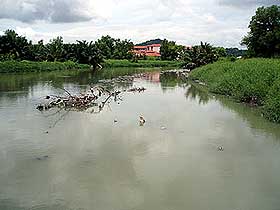AUDIT REPORT An audit of non-metallic mining activities in Kota Tinggi and Kulai in Johor has revealed environmental damages to rivers and water catchment areas.
According to the third series of the Auditor-General's Report 2014 that was released yesterday, trees have been felled on river banks and sand has been mined from river reserve areas – all done without approval.
In addition, changes to the river regime have been made without approval from the Drainage and Irrigation Department (DID), even changing the course of the Sungai Linggiu and increasing the width of parts of Sungai Penggeli and blocking off parts of its water flow.
“Among conditions of the DID is that all trees and plants must be preserved and buffer zones and river reserve areas that are 20 metres wide must not be intruded. The sand mining operators are also not allowed to block or change the flows of rivers and rivulets found in sand mining areas without DID’s permission.
“The audit on the sand mining activities in rivers around the Kota Tinggi district has found that six operators have violated the conditions, including changing the river regime and cutting down trees without DID’s permission, and there are also operators who conducted sand production activities on river reserves,” the audit report says.
The report said the Kota Tinggi District Land Office, in its response to the finding, said the operators have agreed to made changes.
Silt dumped into river
In the case of sand mining activities in PTD 4292, Kota Tinggi, the operator was found to have placed sand processing equipment and its sand stockpiles less than 20 metres from the river bank and dumped silt into the river to ease its sand mining operations.
Local villages have also complained of river bank erosion and water pollution, which the audit confirmed .
 That operator has been ordered to stop and told to make plans for improvement, including by providing a report on its work procedures and drawings from chartered surveyors to show the locations of its pumps, stockpiles and other equipment, the land office said.
That operator has been ordered to stop and told to make plans for improvement, including by providing a report on its work procedures and drawings from chartered surveyors to show the locations of its pumps, stockpiles and other equipment, the land office said.
For PTD 9696 and PTD 8819 in Kota Tinggi, the audit report said the state executive council had decided to impose a moratorium on new temporary occupation licences (TOL) for sand mining since May this year, and no renewals to existing licences would be made once these lapse.
Despite this, TOLs had been issued to the operators who applied to mine sand inland, instead of river sand. However, the auditors found that they had cleared the banks of the Sungai Linggiu, without permission.
Not infomed of moratorium
In response, the Kota Tinggi District Land Office said it and the Johor Land and Minerals Office were not informed of the moratorium until DID started asking for an explanation on the transgressions.
The letter dated June 26, 2015, that explains the state executive council's decision was only addressed to the State Economic Planning Unit, the director of the Johor Water Regulating Body and the Kota Tinggi District Council, it said.
The audit also revealed that three quarry sites in Kota Tinggi and Kulai were found to have sprinkler heads that are not working, although the environmental impact assessment report stipulates that effecitve sprinkler heads must be placed at the equipment and transfer points of the quarries in order to control dust and air pollution.
However, the Kulai District Land Office replied that the sprinkler heads had been used initially, but this caused water to pool and damage the main roads.
Therefore other methods had been employed to control dust, which is scheduled cleaning done by quarry workers armed with brooms, vacuum cleaners and blowers.
In a related matter, Mengkibol assemblyperson Tan Hong Pin issued a statement yesterday urging the state government to take action to preserve the state's water catchment areas.
“Again, I urge that the government gives the highest priority to the preservation and rehabilitation of water catchment areas and enforces the Water Enactment 1921 (Amended 2014) immediately.
“Rehabilitation of the polluted water catchment areas should start immediately, before things become worse,” Tan said.
The audit report also found that mining has been done in nine areas in Kulai that have been classified as agricultural land, although these lands should have been classified as heavy industrial land to draw higher tax rates.
These quarries have been running for up to 49 years on what was supposedly land for the planting of rubber, oil palm and for orchards.
The report said Johor would have gained an additional RM14.69 million if the land use had been properly classified.

